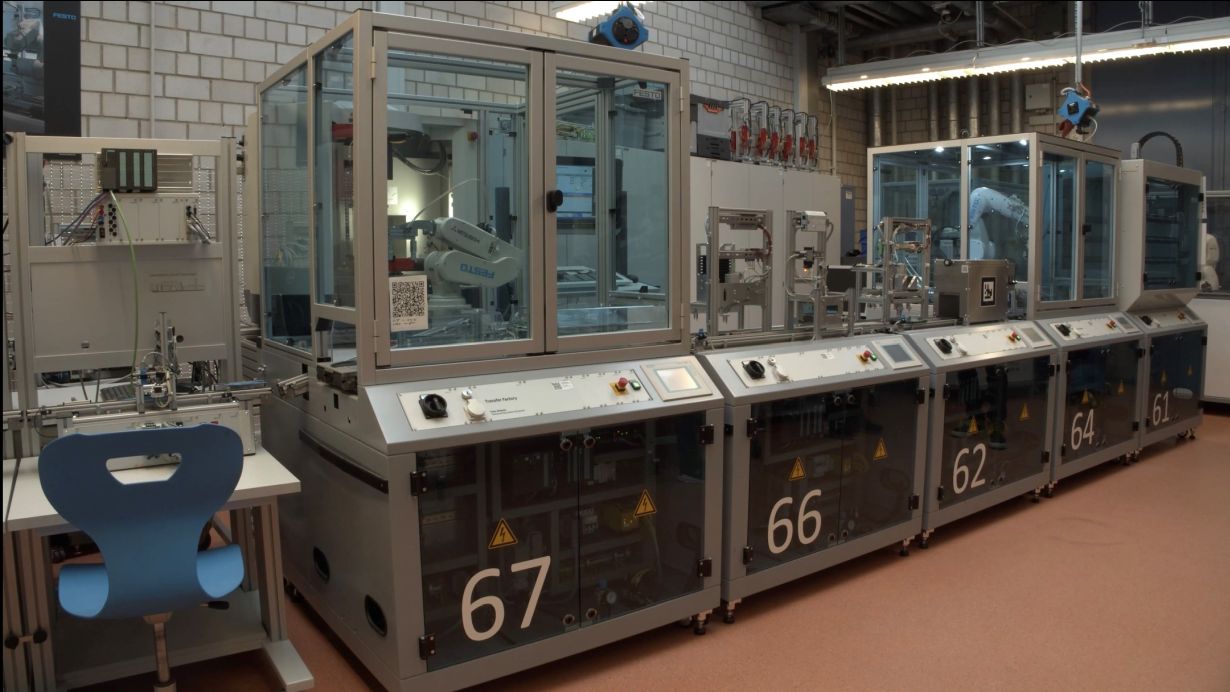
What can so-called learning factories 4.0 do for qualifying skilled workers? Very much, provided that training concepts and conditions are good. This is the result of a study of Karlsruhe Institute of Technology (KIT). According to the authors, vocational schools and companies must cooperate far more closely than before, for example, in aligning offerings and promoting them. In addition, KIT researchers demand improved integration of advanced training into the operations of vocational schools as well as the opening of courses to company trainers. (DOI: 10.5445/IR/1000162893)
Learning factories 4.0 are deemed classrooms of choice for digitized, AI-based production of the near future. Learning factories at companies or vocational schools simulate the new production environments, similar to a flight simulator for training pilots. 43 vocational schools in Baden-Württemberg have learning factories. A study of KIT's Institute for Vocational Education and General Education (IBAP), the University of Education of Schwäbisch Gmünd, and the Industry 4.0 Baden-Württemberg Alliance now reveals that there is a wide gap between ambition and reality: "The potentials of vocational learning factories are far from being exhausted, as favorable framework conditions are lacking at vocational schools. The latter have not yet been supported in implementing advanced training offers," Professor Lars Windelband says. The holder of the Professorship for Vocational Education at IBAP directed the study funded by the Baden-Württemberg Ministry of Economic Affairs, Labor, and Tourism.
Recommendations of Actions and Didactic Concepts for an In-situ Reform
With the help of case studies, conversations, and workshops with experts, the IBAP researchers determined the state of the art of training at vocational learning factories, identified obstacles and challenges, and analyzed examples of successful implementation. Based on their finding that framework conditions at vocational schools are inadequate and collaboration between vocational schools and companies is insufficient, they recommend five actions:
- Changing framework conditions at vocational schools in order to reduce the workload of teachers and have their work in advanced training credited.
- Opening advanced training to company trainers for a better coordination of teaching contents.
- Closer collaboration between vocational schools and companies to better address the latter's needs by training offers tailored to specific target groups.
- Use of central and decentralized platforms for the promotion of training offers.
- Testing alternative models for the long-term support of vocational learning factories.
Success of company training at learning factories will also require convincing approaches to teaching. In the WB@Lernfabriken project, within the framework of which this study was made, the researchers developed a three-stage didactic concept. The first stage is aimed at providing a first overview of knowledge and expertise on Industry 4.0 and AI in order to raise the staff's awareness of digitalization, Industry 4.0, and a networked production. The goal of the second stage is advanced training of specialists, who already have basic digital skills. The third stage then focuses on conveying expertise on concrete company problems, such as optimization and maintenance of plants.
"Vocational learning factories," study director Windelband summarizes, "are facing major structural challenges. However, if they succeed in playing on their assets compared to other training providers, they can - especially in the context of the ongoing technological upheaval in industrial production - be those 'beacons of further education' as which they were originally conceived."
Original Publication
Lars Windelband, Viktoria Bergmann, Olga Reifschneider, Daniela Reimann, Martin Schwarz: Handlungsempfehlungen zur inhaltlichen Umsetzung von Lernfabriken für die berufliche Weiterbildung. KIT Scientific Working Papers, 2023. DOI: 10.5445/IR/1000162893. (Recommended actions for the use of learning factories for vocational training)






